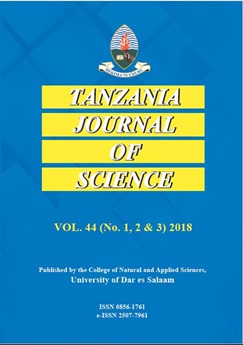Evaluation of Natural Antifungal Compounds from Artemisia afra and its Effectiveness on Prevention of Aflatoxins
DOI:
https://doi.org/10.4314/tjs.v48i3.2Abstract
Artemisia afra is a medicinal plant with antimicrobial activities, known to treat tuberculosis, measles, cough, and influenza. In consequence, its applications have increasingly become pivotal to control various microbes which cause different diseases. This study therefore, evaluated the chemical composition and the antifungal activity of A. afra essential oil. The extraction of essential oil was done using steam distillation. The essential oil chemical composition was analysed by GC-MS. The analysis revealed 19 compounds from A. afra. The main compounds were borneol (71.529%), terpinen-4-ol (8.582%), β-thujone (3.283%), β-terpineol (2.590%), α-terpineol (1.791%), chrysanthenone (1.507%), myrtenal (1.393%), eucalyptol (1,8-cineole) (1.263%), cis-sabinene hydrate (1.172%) and trans-carane, 4,5-epoxy (1.088%). The growth and aflatoxin production inhibitions against A. flavus were determined via antifungal and antiaflatoxigenic bioassays of the A. afra essential oil at the concentration range of 10 €“50 µL/mL using a poisoned-food method. The quantification of the aflatoxins production was carried out using high-performance liquid chromatography. The antifungal activity of A. afra essential oil was effective against A. flavus with growth inhibition of 99.97 €“99.99% and controlled aflatoxins production by 99.25 €“99.63%. The results indicated that A. afra essential oil can become an alternative natural fungicide for the control of A. flavus growth and aflatoxins production.
Keywords: Artemisia afra; essential oil; A. flavus; aflatoxins; GC-MS.


